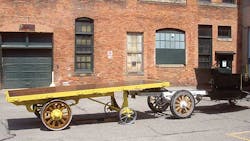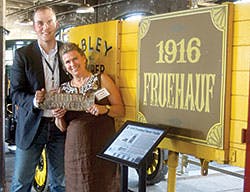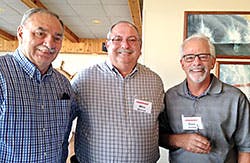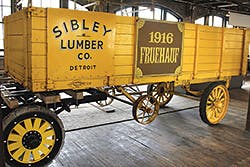Fruehauf Trailer Company alumni gathered in Detroit recently for a homecoming reunion to celebrate the company that was once the largest trailer manufacturer in North America.
Fruehauf was founded in 1914 and held over 1000 patents. It filed for bankruptcy in 1997 and its assets were purchased by today’s Wabash National. Trailers are still produced under the Fruehauf name in many countries, including Mexico.
The reunion began with a tour of Fruehauf’s former World Headquarters on Harper Avenue, now home to PVS Chemicals. It included a visit to the Fruehauf First Name in Transportation exhibit at the Detroit Historical Museum, and concluded with presentations at the Ford Piquette Avenue plant. That facility was the birthplace of the Model T Ford and has several vintage cars and trucks on display. Former “Fruehauf’ers” who now work for manufacturers including Wabash National, Great Dane, Hyundai, and Manac attended.
Ruth Fruehauf, youngest daughter of Roy Fruehauf and granddaughter of company founder August Fruehauf, arranged the event, along with Don Armbruster, Rick Neumann and Randy Shelton, whose rebuilt 1916 Fruehauf semi-trailer is on display at the Ford Piquette Plant Museum.
Ruth Fruehauf presented a detailed slide show based on her book, Singing Wheels: A History of the Fruehauf Trailer Company. The early years of trailer manufacturing were covered in a presentation by John Conley, who is currently writing a book, Truck by Trailer: The History of the Truck Trailer Manufacturing Industry, for the Truck Trailer Manufacturers Association’s 75th Anniversary in 2017.
Ruth Fruehauf and Darlene Norman have created the Fruehauf Trailer Historical Society, an organization dedicated to the preservation of the history of Fruehauf Trailer Company and the Fruehauf family legacy. The society has created historical books and a traveling exhibit rich with Fruehauf memorabilia and archival materials. Planned for 2016 are three books, The Fruehauf Promotional Story, 1926-1960, Fruehauf and World Wars and the Military, and Fruehauf, the First Name in Transportation, an in-depth analysis of the company’s history.
Ruth Fruehauf, with a career in the business of fine art marketing and sales, has developed an expertise and understanding of expensive works of art and those who build these collections. She incorporates this present-day awareness about people and power with the insights gleaned as a child, at the sleeve of her father, who was at the peak of his success when she was born.
Several years ago, upon the death of her mother, she came into possession of her father’s personal and business papers, which began to expand her understanding of her father. He died in 1965, when she was only eight. She has vivid memories of her larger-than-life father, although some gaps remained.
Additionally, memories of him that have been passed down by a multitude of his friends, business associates and colleagues have accumulated over the years. She has encountered over and over again, people who knew her dad. They would enthusiastically offer story upon story of her father’s generosity, business acumen, and dedication to customers. These “social” encounters became the norm no matter where she went, New York, Palm Beach, Palm Springs, Chicago, San Francisco and Paris and London. She began to explore the events of his professional and personal life as it is entwined with Fruehauf Trailer Company’s history.
Encouraged by the enthusiasm and interest of friends and motivated to answer a persistent question—”What happened to Fruehauf Trailer Company?”—Ruth has been working on the book project for most of her adult life.
With the assistance of Norman, a researcher and historian, they discovered Roy’s boxes contained a wealth of documents, photographs, scrap books and correspondence from major and minor historical figures. She was amazed to discover how truly enmeshed his life was with our country’s history in the 1940s through the 1960s. The documents and scrapbooks of news clippings record major events in her father’s career with Fruehauf Trailer Company. ♦
Fruehauf’s history is kept alive through the website
www.singingwheels.com and a Facebook page.
Reunion pictures can be viewed at
http://www.singingwheels.com/fruehauf-reunion.html




